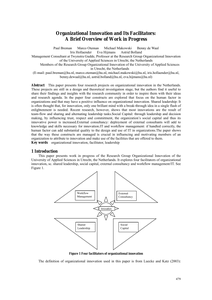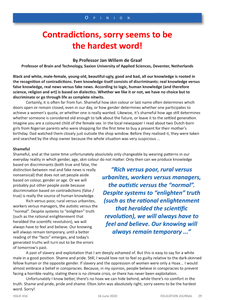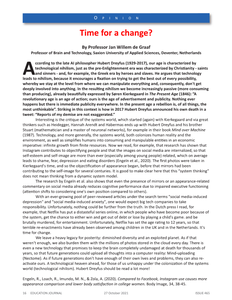This article attempts to broaden the theoretical boundaries of journalism studies by re-examining journalism practices in the context of divisions between Western and Eastern philosophies. It looks at journalistic techniques of truth-seeking with particular emphasis on i) the ability to pick up a ‘scoop’, that is an original story; ii) interviewing as an art of inquiry, and iii) the use of statistics in supporting evidence. By so doing, the authors want not only to problematise the debates between epistemology and ontology within the boundaries of journalism studies, but also see how Eastern philosophies can help to allocate this debate in a more globalised context that can overcome the limitations set by the Enlightenment as a political project.
LINK
This paper presents four research projects on organizational innovation in the Netherlands. These projects are still in a design and theoretical investigation stage, but the authors find it useful to share their findings and insights with the research community in order to inspire them with their ideas and research agenda. In the paper four constructs are explored that focus on the human factor in organizations and that may have a positive influence on organizational innovation. Shared leadership: It is often thought that, for innovation, only one brilliant mind with a break-through idea in a single flash of enlightenment is needed. Recent research, however, shows that most innovations are the result of team-flow and sharing and alternating leadership tasks. Social Capital: through leadership and decision making, by influencing trust, respect and commitment, the organizations social capital and thus its innovative power is increased. External consultancy: deployment of external consultants will add to knowledge and skills necessary for innovation. IT and workflow management: if handled correctly, the human factor can add substantial quality to the design and use of IT in organizations. The paper shows that the way these constructs are managed is crucial in influencing and motivating members of an organization to attribute to innovation and make use of the facilities that are offered to them.
DOCUMENT

Rich versus poor, rural versus urbanites, workers versus managers, the autistic versus the “normal”. Despite systems to “enlighten” truth (such as the rational enlightenment that heralded the scientific revolution), we will always have to feel and believe. Our knowing will always remain temporary, until a better reading of the “facts” emerges, and today’s generated truths will turn out to be the errors of tomorrow 's past.
MULTIFILE

Op 1 oktober jl. heeft de Commissie Toekomst Accountancysector (CTA) haar voorlopige bevindingen [12] gepresenteerd in het kader van het door de minister van Financiën ingestelde onderzoek naar de mogelijkheden om de kwaliteit van de wettelijke accountantscontrole duurzaam te verhogen. In deze voorlopige bevindingen, bestaande uit – 348 bullets verdeeld over 101 pagina’s en over 12 hoofdstukken – gaat het veel over kwaliteit en slechts beperkt over transparantie. Het (deel)woord ‘kwaliteit’ komt 402 maal voor. Het woord ‘transparantie’ komt daarentegen slechts 18 maal voor. Op verzoek van de CTA heeft het Erasmus Competition & Regulation institute (ECRi) een literatuurstudie uitgevoerd naar kwaliteitsverbeterende maatregelen in de accountancysector [11]. In deze literatuurstudie komt het woord ‘transparantie’ 10 maal voor (transparency, 2 maal).
LINK
Education plays a major role in this paradox: the cultural diversity that is increased by immigration is eliminated by successful education: education aims to maximise the opportunities for every child within the emerging global culture and thus reduce cultural diversity. The road from the Enlightenment that would bring us a better world is increasingly proving to be a dead end, especially with regard to the climate and the depletion of the resources the planet can provide (ecology). Just now that a global culture has emerged into which all those other cultures are assimilated, the question is whether cultures that deal more sustainably with ecology and have problems accommodating to global culture, should not be given more voice in the transition to a more sustainable global culture. It is argued that in popular music forms an example in which successful productions have a multitude of cultural styles, from world music to hip-hop to rock. In fact, almost everyone from various cultural backgrounds can relate to a certain style. Pop music therefore does not necessarily work as an institution that reduces diversity. Education does just that, unconsciously, and often with extensive inclusion programs. She could learn from pop music!
MULTIFILE

This exploration with ChatGPT underscores two vital lessons for human rights law education. First, the importance of reflective and critical prompting techniques that challenge it to critique its responses. Second, the potential of customizing AI tools like ChatGPT, incorporating diverse scholarly perspectives to foster a more inclusive and comprehensive understanding of human rights. It also shows the promise of using collaborative approaches to build tools that help create pluriversal approaches to the study of human rights law.
MULTIFILE

In this critical review article an adopted framework from critical theorists will be introduced in order to question the alleged neutral objectivity in social scientific discussion. This old discussion-on value free science-becomes increasingly evident through the illustration of the relevant example of how academics concealed their positions of neutrality just before the 86th annual tourism conference of the Organization for Economic Co-operation and Development (OECD), October 2010 in Jerusalem. This critical review article continues by analyzing the relatively high amount of email reactions to a Palestinian tourism scholar who called for support from the tourism academic community for the rejection of Jerusalem as the place where the conference will be held. On the basis of this material, three categories of reactions will be introduced and organized as a normative, critical discussion. In this discourse, an emancipatory perspective on this topic will be presented. This emancipatory knowledge will give voice to the marginalized and less heard voices in this region. With these voices a counterdiscourse can be organized in this region in which Arendt's "agora" will be introduced as a place of plural discussions. The intention of this revitalized critical discussion is to create a climate of broader enlightenment that ultimately goes beyond the perspectives of individual parties.
LINK
Our age is, according to Hubert Dreyfus, characterized by technological nihilism, just as the pre-Enlightenment era was characterized by Christianity - saints and sinners - and, for example, the Greek era by heroes and slaves. Nihilism, because technology encourages a fixation on trying to get the best out of every possibility, whereby we stay at the level from where we can manipulate everything and, consequently, don 't get deeply involved into anything. In the resulting nihilism we become increasingly passive (more consuming than producing), already beautifully expressed by Søren Kierkegaard in The Present Age (1846): ”A revolutionary age is an age of action; ours is the age of advertisement and publicity. Nothing ever happens but there is immediate publicity everywhere. There is even a new technology that promises to keep the brain completely undamaged at death for thousands of years, so that future generations could upload all thoughts into a computer reality: Mind-uploading (Nectome). As if future generations don 't have enough of their own lives and problems, they can also reactivate ours. A technological heaven ahead, for those of us unhappy under the colonization of the systems world (technological nihilism). Hubert Dreyfus should be read a lot more!
MULTIFILE

What does it mean to position anthropos in the center? Questioning anthropocentrism is far more than an academic exercise of debating the dominant cultural motif of placing humans at the center of material and ethical concerns. It is a fertile way of shifting the focus of attention away from the problem-symptoms of our time (be these symptoms as far-reaching as rapid climate change or as inconvenient as “just” jellyfish jamming the machine) to the investigation of root causes. And certainly the dominant beliefs, values, and attitudes guiding human action constitute a significant driver of the pressing problems of our day. https://doi.org/10.1007/s10624-014-9362-1 https://www.linkedin.com/in/helenkopnina/
MULTIFILE
